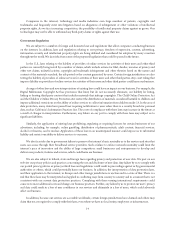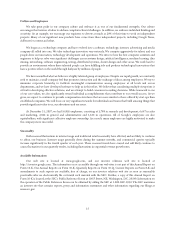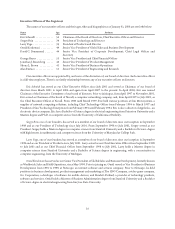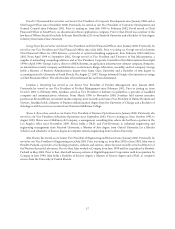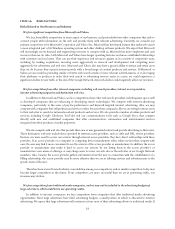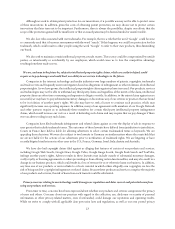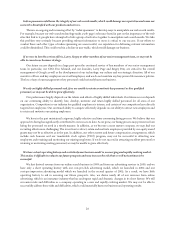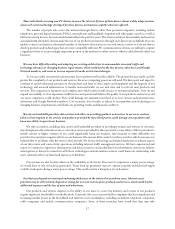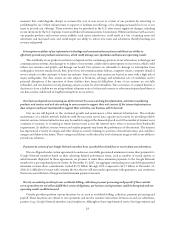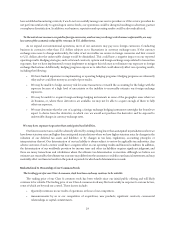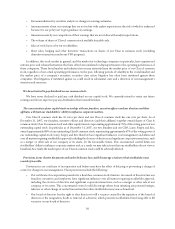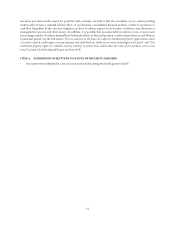Google 2007 Annual Report Download - page 37
Download and view the complete annual report
Please find page 37 of the 2007 Google annual report below. You can navigate through the pages in the report by either clicking on the pages listed below, or by using the keyword search tool below to find specific information within the annual report.Although we seek to obtain patent protection for our innovations, it is possible we may not be able to protect some
of these innovations. In addition, given the costs of obtaining patent protection, we may choose not to protect certain
innovations that later turn out to be important. Furthermore, there is always the possibility, despite our efforts, that the
scope of the protection gained will be insufficient or that an issued patent may be deemed invalid or unenforceable.
We also face risks associated with our trademarks. For example, there is a risk that the word “Google” could become
so commonly used that it becomes synonymous with the word “search.” If this happens, we could lose protection for this
trademark, which could result in other people using the word “Google” to refer to their own products, thus diminishing
our brand.
We also seek to maintain certain intellectual property as trade secrets. The secrecy could be compromised by outside
parties, or intentionally or accidentally by our employees, which would cause us to lose the competitive advantage
resulting from these trade secrets.
We are, and may in the future be, subject to intellectual property rights claims, which are costly to defend, could
require us to pay damages and could limit our ability to use certain technologies in the future.
Companies in the internet, technology and media industries own large numbers of patents, copyrights, trademarks
and trade secrets and frequently enter into litigation based on allegations of infringement or other violations of intellectual
property rights. As we have grown, the intellectual property rights claims against us have increased. Our products, services
and technologies may not be able to withstand any third-party claims and regardless of the merits of the claim, intellectual
property claims are often time-consuming and expensive to litigate or settle. In addition, to the extent claims against us are
successful, we may have to pay substantial monetary damages or discontinue any of our services or practices that are found
to be in violation of another party’s rights. We also may have to seek a license to continue such practices, which may
significantly increase our operating expenses. In addition, many of our agreements with members of our Google Network
and other partners require us to indemnify these members for certain third-party intellectual property infringement
claims, which would increase our costs as a result of defending such claims and may require that we pay damages if there
were an adverse ruling in any such claims.
Companies have filed trademark infringement and related claims against us over the display of ads in response to
user queries that include trademark terms. The outcomes of these lawsuits have differed from jurisdiction to jurisdiction.
Courts in France have held us liable for allowing advertisers to select certain trademarked terms as keywords. We are
appealing those decisions. We were also subject to two lawsuits in Germany on similar matters where the courts held that
we are not liable for the actions of our advertisers prior to notification of trademark rights. We are litigating or have
recently litigated similar issues in other cases in the U.S., France, Germany, Israel, Italy, Austria and Australia.
We have also had copyright claims filed against us alleging that features of certain of our products and services,
including Google Web Search, Google News, Google Video, Google Image Search, Google Book Search and YouTube,
infringe another party’s rights. Adverse results in these lawsuits may include awards of substantial monetary damages,
costly royalty or licensing agreements or orders preventing us from offering certain functionalities, and may also result in a
change in our business practices, which could result in a loss of revenue for us or otherwise harm our business. In addition,
any time one of our products or services links to or hosts material in which others allegedly own copyrights, we face the
risk of being sued for copyright infringement or related claims. Because these products and services comprise the majority
of our products and services, the risk of harm from such lawsuits could be substantial.
Privacy concerns relating to our technology could damage our reputation and deter current and potential users from
using our products and services.
From time to time, concerns have been expressed about whether our products and services compromise the privacy
of users and others. Concerns about our practices with regard to the collection, use, disclosure or security of personal
information or other privacy-related matters, even if unfounded, could damage our reputation and operating results.
While we strive to comply with all applicable data protection laws and regulations, as well as our own posted privacy
23



